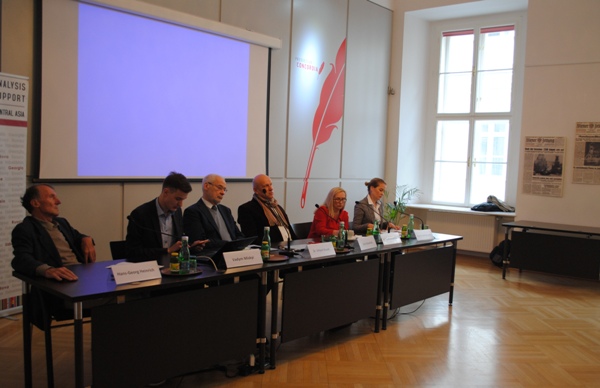Institute of World Policy in partnership with the ICEUR-Vienna organized a public discussion “European Ukraine: Real Prospects, Real Problems” dedicated to Ukraine’s progress in reforms.This event was an attempt at stimulating public discussion on the role and dynamic of post-Maidan Ukraine within a wider Europe against the backdrop of recent events (refugee and debt crisis, Russian involvement in Syria, agreement on Iranian nuclear programs).
Opening remarks: Alyona Getmanchuk, Director, Institute of World Policy
Panelists:
Oleh Rybachuk, Former Deputy Prime Minister of Ukraine on European Integration, Director of “Centre UA”
Vadym Miskyi, Expert of the Reanimation Package of Reforms
Dr. Erhard Busek, Former Vice Chancellor of Austria
Dr. Heidemaria Gürer, Head, Department for Eastern Europe, Central Asia, Eastern Partnership, Federal Ministry for Europe, Integration and Foreign Affairs
Moderation:
Hans-Georg Heinrich, Vice President, ICEUR-Vienna
{1}
{2}
Dr. Erhard Busek, Former Vice Chancellor of Austria, Oleh Rybachuk, Director of “Centre UA”, Dr. Heidemaria Gürer, Head of the Department for Eastern Europe of Austrian MFA, Alyona Getmanchuk, Director of the Institute of World Policy
{4}
Main remarks made by Dr. Erhard Busek, Former Vice Chancellor of Austria
Now the refugee question has primary consideration but this is not justified, because concerning the shape of Europe in the future Ukraine issue is extremely important. This is one of the key questions: Is Europe (member states of the EU together) able to handle the whole continent?
The next step what we have to do is (as a former member of the government I am always sceptical with governments really able to do something) to support the civil society, to push them forward and take more responsibility.
However, don’t leave the politics out, or the governments. I think we should establish for Ukraine something similar as ‘Berlin process’ (for the Balkans). When not only the politicians take part in the discussion of the problem, but also representatives of civil society and business community. It is a good start, it will create some obligations.
It is not necessary for Austria take the leadership because it is a common European responsibility to move things forward. However, the Austrians can push for this, together with some others within the European Union (Poland, for example).
The knowledge about Ukraine in Vienna and in the member states of the European Union is very limited. We should develop people-to-people contacts, especially exchange programs for youths.
There is a certain tendency in Austria saying it’s up to the foreign ministry. No, it’s up to the whole government to take the responsibility concerning Ukraine and its progress on reforms. Austria has been previously engaged in Ukraine.
Main remarks made by Dr. Heidemaria Gürer, Head of the Department for Eastern Europe, Ministry of Foreign Affairs of Austria
The idea of Vice Chancellor Busek (to establish some kind of Berlin process for Ukraine) is a good one, however maybe Austria is not the country to take the lead.
Because of the refuge crisis there is an impression that Ukrainian question has a tendency to be forgotten by the EU and Austria. I cannot share these opinions. Ukraine was in the centre of attention of the Austrian MFA even before this government. From the EU point of view and from the Austrian point of view – Ukraine is not forgotten.
Austria even decided to increase our development cooperation aid for Ukraine. We have only five focus countries in Europe. Ukraine is not one of those, but we are increasing our development cooperation for Ukraine this year and it will be continued next year. This is also a kind of expression of how we see the situation in Ukraine, and how close Ukrainian developments for Austrians politicians.
We hear from time to time some critics that the EU might not be involved enough in the solution of the Ukrainian crisis. The EU as organization does not take part in the negotiation formats created to solve the crisis; however the EU is represented there by its member states. Talking about OSCE monitory mission, the highest number of monitories comes from the EU member states. There is also the EU Ukrainian support group, to which member countries send their representatives.
All aid promises made by the EU to Ukraine amounts to 30 million dollars, 6 million of which have been already given to Ukraine. Sometimes, I hear that these funds are not enough, especially comparing with Greece, but Greece is a part of the EU and Ukraine is not.
I think there are enough signs that the EU has not forgotten about Ukraine. The EU is also pushing forward for a solution of the Ukrainian crisis, and on the other hand pushing forward Ukraine progress in reforms.
The DCFTA is entering into force on the 1st of January 2016. To ease the tensions with Russian the EU has to continue talks with Russia about DCFTA and Association Agreement. However, this discussions and talks in no ways mean that Russia would get the power to veto these agreements with the EU.
{3}
Hans-Georg Heinrich, Vice President of the ICEUR-Vienna and Vadym Miskyi, Expert on Reanimation Package of Reforms
{5}
Jörg Wojahn, Head of the represantation of the European Commission in Austria
{6}
Ambassador of Ukraine to Austria Olexander Scherba
{7}
{9}
In the end of the last year the Institute of World Policy organized similar public debate on situation in Ukraine with the Italian policymakers and stakeholders in Rome. On September the public debate titled “Ukraine: What Model to Implement?” was held in Berlin.
The public debates in the EU capitals are organized under “New European Policy: Filling the Awareness Gap” project, conducted with the support of Ukraine National Initiatives to Enhance Reforms (UNITER), a program funded by USAID and implemented by Pact Inc.




Comments theme
Comments themeComments themeComments themeComments themeComments themeComments themeComments themeComments themeComments themeComments themeComments themeComments themeComments themeComments themeComments themeComments themeComments themeComments themeComments themeComments.